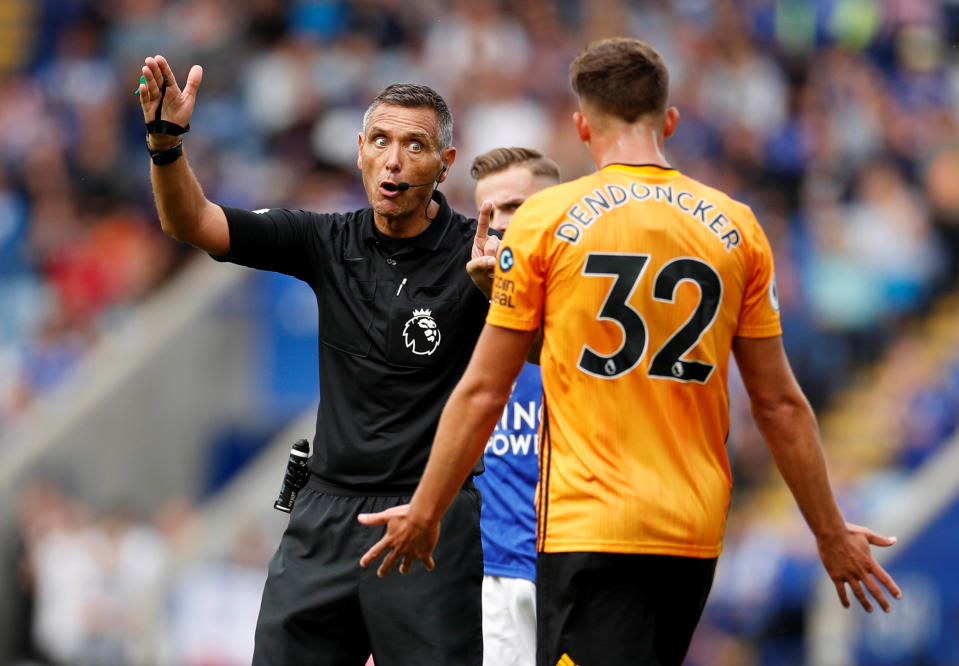VAR is already faltering in the Premier League, which raises one big question
Up until this season, the lack of a Video Assistant Referee in the Premier League somehow felt both antediluvian and refreshing. It seemed out of step with the times not to have video replay, yet it was also kind of nice that the specter of a review didn’t hang over every goal that was even somewhat close to a foul or an offside.
A goal was a goal. Time to celebrate, rather than suspend your joy for a minute or so, taking the fizz out of the rare releases offered up by a ponderous sport.
But, inevitably, the Premier League went along with this sudden obsession with accuracy in the game. It kind of had to. Whenever a key call was blown, it was getting a bit embarrassing to be one of the few major leagues not to have it. So VAR it was. And it’s now been exactly one full matchday since its introduction. Already, it has faltered.
The Premier League intended to use the technology, which so disrupts the flow of a game dictated by rhythm and momentum, as sparingly as possible. Review would be reserved for refereeing mistakes that were clear and obvious, in the parlance. The league very well understands that what sets it apart, the thing the Premier League owes its staggering popularity to, is its unmatched intensity. Yet a few times during the first slate of games, VAR was called on to adjudicate miniscule margins that were far from evident even upon endless replay and that did nothing but stifle that intensity.

On Saturday, Gabriel Jesus and Manchester City were denied a goal in their 5-0 romp of West Ham United because Raheem Sterling’s shoulder had crept an inch or two ahead of his defender’s in the buildup. His shoulder. Which had no relevance to the play but, by the letter of the law, counted nonetheless.
Sunday, Wolverhampton Wanderers would likely have beaten Leicester City had a VAR check not disallowed Leander Dendoncker’s goal on account of Willy Boly’s accidental, close-range hand-ball that allowed the ball to drop fortuitously for the shot. It took several replays for even the TV announcers to see that something improper had happened.
Clear and obvious? No.
But then both decisions were correct, or adhered to the rules anyway. But that didn’t make them particularly satisfying for the neutral fan. And it begs the question: Is fairer sport also better sport?
Put differently: Does soccer, as a product, actually benefit from being refereed marginally more fairly when it comes at the expense of the viewing experience? Even the most ardent VAR supporter can’t deny that it casts a shadow over goals and interrupts the game in a way that is, at the absolute least, a nuisance.
So how important is it for a few calls a game to stand a better chance of being right, really?
The charm of sports is their humanity. And to err, as Alexander Pope taught us, is human. At the highest level, sports boil down to the avoidance of mistakes, which are ruthlessly set upon by opponents programmed to exploit them. Human error is the point. And the referees have a part to play in that. They’re part of the drama, characters in the narrative that keeps the soccer industry going.

Professional sports are, after all, entertainment before all else. Stop entertaining the fans and the whole thing comes apart. This new need for total accuracy on refereeing calls, which is still very much a utopia anyway, eats away at that entertainment. Sitting around a while, waiting for a goal to be confirmed or denied, isn’t entertaining.
The trouble is that as the technology currently exists, there is no ensuring complete accuracy, or even something close to it, while protecting that all-important cadence of a well-played soccer game. The swings of possession, the attacks and counter-attacks, the flurries of chances, it all grinds to a halt for a VAR review. And what for? To give an expanded team of referees a larger role, when the best games tend to be the ones in which they pass through inconspicuously?
Every season, VAR will allow some dubious goals and rule out others that appeared legitimate – just as referees were doing before it came along. It won’t get all of it right, but it will get more of it right. The technology will eventually get better and maybe VAR will even stop feeling so intrusive.
But none of that explains what is gained, exactly, by its introduction. Fairness doesn’t necessarily beget better entertainment. And sometimes it even stands in the way of it.
Leander Schaerlaeckens is a Yahoo Sports soccer columnist and a sports communication lecturer at Marist College. Follow him on Twitter @LeanderAlphabet.
More from Yahoo Sports:


